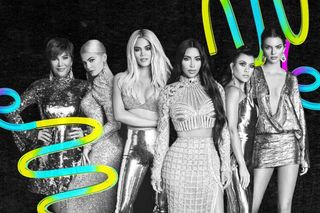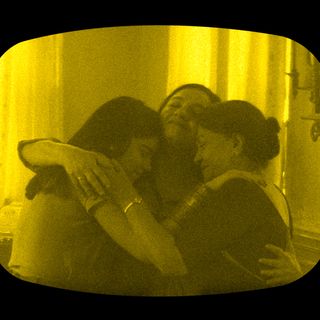
Overrated, Not: Reality TV
However contrived, managed, or heavily produced, reality TV offers a glimpse into our own dark hearts — reflecting our own desires back to us and performing a ritual of emotional purging on behalf of a society too...

In ‘Overrated, Not,’ we revisit things that were so good, they quickly turned bad, and make a case for why they deserve a comeback.
There are many who have gone on to declare the Kardashians as representatives of the hellfire of damnation — for destroying civility, embodying excess, and dripping with wasteful extravagance. Their worst offence, however, is supposedly their role in the ruination of culture, refinement, and taste.
It’s not just the Kardashians, although they represent the epitome of this sentiment. It applies to shows about teen pregnancies, Paris Hilton and Nicole Richie living like poor people for a day, or a bunch of attractive people forced to cohabitate under the same roof under unceasing surveillance. The so-called “debauchery” knows no end, as curse words fly and emotions flow in copious excess.
We love to hate reality TV — indeed, its heyday may be drawing to an end. And yet, they offer something beyond just guilty pleasure. Studied by sociologists, media analysts, journalists, and culture critics, reality TV is a force that, more than we realize, acts as a mirror to the parts of us that we keep spruced, polished, and tucked away.
Take Keeping Up With the Kardashians. For 11 years it followed the lives of a clan of women whom the world self-righteously claims to despise, but somehow can’t get enough of. The Kardashian sisters — Kim, Kourtney, and Khloe — are the main trio, with their Jenner half-sisters Kylie and Kendall rapidly catching up in fame and popularity. At the helm is “momager” Kris — who is the glue that holds the hot mess together. While many tend to scoff at the Kardashian-Jenners, I see them as a family that has offered itself up for study. Here are human beings who are willing to be the world’s emotional exhibits, allowing their feelings, fights, mundanities, and meltdowns to be publicly documented, fulfilling a voyeurism we didn’t know we even had.
The drama — often revolving around absurd trivialities — gets positively operatic. Think Pooja’s infamous meltdown from Bigg Boss, whose hissy fit became such a viral sensation that,years later, it has still not been lived down. However contrived, managed, or heavily produced, reality TV like this offers a glimpse into our own dark hearts — if they’re not authentic, if they’re indeed staged (as they are), it’s keeping what audiences themselves want to see. If Kim cries hysterically over a lost earring, it’s because we want her to become the receptacle of our scorn and derision; we need someone to laugh at, look down upon, and reality stars know it. In a way, they reflect our own desires back to us, performing a ritual of emotional purging on behalf of a society too repressed to manage it on its own. When we ironically say “Pooja, what is this behavior?” we’re asking this of the version of ourselves that has secretly wanted to be Pooja for a fleeting moment.
Not all reality TV is as low-brow as that — though cultural meanings ascribed to high-brow and low-brow are arguably up for debate. While the most enduring ones cater to our more baser instincts, there are those that appeal to other emotions. Queer Eye, for instance, is a wholesome show about five gay men swooping in and transforming the lives of individuals who aren’t as well-adjusted. Its popularity derives from our own vulnerability: in many ways, we all want kind, benevolent people picking up our pieces and fixing us, even if for a while.
Related on The Swaddle:
Karan Johar’s ‘What The Love?’ Forges Fairytales, Not Relationships or Wokeness — but That’s Fine
Then there are those that blur the line between philosophical thought experiments and romance, with even a little bit of game theory thrown in. Too Hot to Handle is a recent reality show whose premise is simple: attractive people are stuck on a beautiful island with just one rule — they’re not allowed to be intimate with one another in any way. Anyone breaking the rules will lead to the overall prize money significantly dropping for whoever wins. Watching the most beautiful people with oodles of sex appeal struggle to lay their hands off one another and begin to unravel is a spectacle ripe for unpacking. It’s not only extremely fun to watch — it made for procrastinating social science students (me) begin to ponder free market economics. Turns out that the “rational human being” whose behavior is explained by the profit maximizing motive — a hypothetical person around whom entire economies have been constructed — is clearly a fallacy. Even in the face of heaps of money, here are pretty people whose rational senses take leave of them when they lay their eyes on another pretty person.
Is this over-intellectualizing it? Yes and no. Don’t take it from me: no less an intellectual giant than anthropologist Margaret Mead wrote that the televizing of the life of a Californian middle-class household in the 70s was “a new kind of art form… as significant as the invention of drama or the novel.” But the point is that there’s something for everyone because at their very heart, reality shows consist of people behaving like human beings at their most unfiltered. Ironically, even as many aspects of reality TV are filtered keeping audience favorability in mind, it’s still unhinged and delicious for the way it shows us the side of ourselves that we think we’re better than. Indeed, we can walk away from reality TV feeling better about ourselves — which, in itself, is not a bad thing to walk away with.
In a way, they perform a service for us all. “They have the visceral impact of documentary reportage without the self-importance and general lugubriousness. Where documentaries must construct their narratives from found matter, reality TV can place real people in artificial surroundings designed for maximum emotional impact,” as The Atlantic notes.
Speaking of Big Brother and Survivor, the New Yorker notes: “Both of these were essentially game shows, but they doubled as earthy anthropological experiments, and they convinced viewers and executives alike that television could provide action without actors.”
And what action! In no other form of entertainment — even art — are we offered such a glimpse of emotional explosiveness simply for its own sake. None of these people are artists but they, nevertheless, are the art worth studying, or at the very least, paying attention to. “Her sincerity and moral directness stuck in people’s consciousness and brought reality TV to everyone’s attention,” June Deery, professor in media studies at New York’s Rensselaer Polytechnic Institute, told BBC about one contestant on Survivor.
Then, reality TV also traces the story of our society’s evolution. Teen Mom was one of the biggest shows in the 2000s that offered a similarly riveting look at changing American norms around female sexuality, motherhood, and family values. The promos sensationalized the lives of young women, capitalizing on pre-existing voyeurism about teen girls. And the show itself offered a no-holds-barred look at the emotional fallout of becoming young mothers for all to see. The Bachelor franchise, on a similar vein, offers another kind of look into our rituals of courtship and romance taken to their extreme and logical conclusions — literally showing, not telling us, how we are and pretend not to be in the throes of lust and love. Selling Sunset is another recent show following the travails of the rich in ways that undermine the veneer of sophistication they have from a distance. The competitive aspect of it adds a layer of cruelty and Schadenfreude — both unwholesome emotions that need an outlet, which we often find in people much wealthier or more attractive or than most of us can ever be.
Moreover, reality TV shows that people are worthy, of some social use to us, even teach us something, without seemingly displaying a specific talent other than being themselves. The infamous adage of “being famous for being famous” no longer quite holds: not just anyone can accomplish this. It takes a level of diva-ness, sass, and a sky-high threshold of personality coupled with the willingness to commodify themselves for public consumption. Who among us has the wherewithal to stand up to the task?
Rohitha Naraharisetty is a Senior Associate Editor at The Swaddle. She writes about the intersection of gender, caste, social movements, and pop culture. She can be found on Instagram at @rohitha_97 or on Twitter at @romimacaronii.
Related


Ms. Marvel’s Story Avoids Hero‑Worship, Humanizes Her Through the Lens of Community
